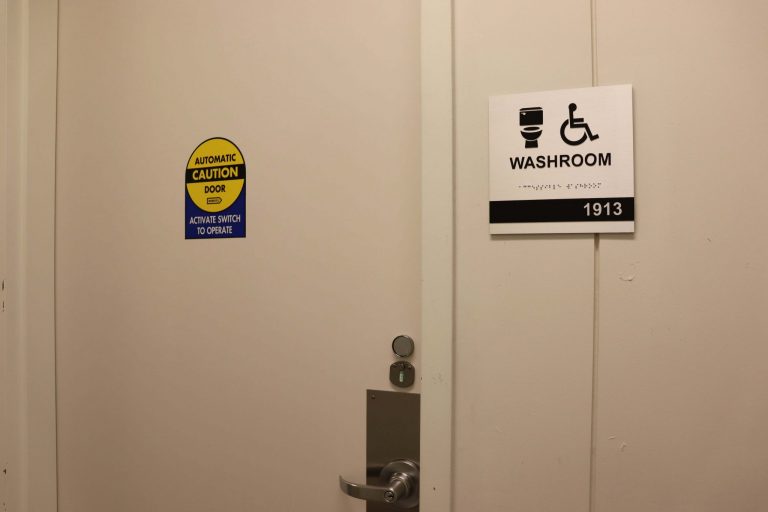August 2022
Clean, Safe and Accessible – Loving my home Washroom!
As I sit at my desk typing, drinking coffee and eating an English muffin, I can see my washroom only meters away, and this brings me comfort. I am not happy that a worldwide pandemic created my at-home office, but I am happy I work only steps away from a washroom which is clean, well-stocked and has hand soap that does not dry out my skin and toilet paper that doesn’t scratch my butt. I am also happy I am not sharing this washroom with anyone but a curious dog.
Washroom use can be a cause of distress for many reasons, some of which I have written about in the past, such as menstruation and gendered washrooms. There are many other reasons someone may want or need to be close to a washroom.
We all pee. We all poo. Some of us menstruate. Some people vomit for reasons such as sickness, pain, anxiety, purging, or medication that causes nausea. All of this is safer, comfortable and relaxing with a washroom which is clean, private and accessible.
We need to destigmatize conversations about how our bodies function and what comes out of them. We have an assortment of confusing and vulgar slang to describe urinating, pooping, vomiting and having a period, and we were taught it is not “proper” dinner table conversation—even though it may be dinner that sends us rushing to the washroom! Farts remain funny way past childhood, and many people will not poo in public. The embarrassment and discomfort with these topics are real.
Let’s begin with urine because it may be the least controversial thing that comes out of the body. I like to drink lots of water and, sometimes, lots of coffee . Both of these send me to the washroom A LOT! Because I am at home, I drink them freely; however, if I am not at home, I limit them drastically, which sometimes results in headaches and dehydration.
There are also conditions such as bladder or bowel incontinence which alter the ability of the body to control evacuation of urine and fecal matter. There is urge incontinence, sometimes called overactive bladder or bladder spasms, which leads to the sudden urge to urinate and, often, leaks. There is also stress incontinence, which happens when physical movement or activity such as coughing, sneezing, laughing, running, or lifting puts pressure on the bladder and causes a leak.
Pregnancy, giving birth, hormone imbalances, medications, surgery and other conditions can also lead to bladder and bowel control difficulty. Some people have irritable bowel syndrome, Crohn’s disease or dolitis. Some people have food allergies or sensitivities which cause bowel issues. Diarrhea or constipation are common symptoms.
I think it is safe to assume most of us would rather leak urine at home, close to a washroom and change of clothes.
Diarrhea can be a washroom emergency, and constipation can be painful and frustrating. The ability to relax and spend the amount of time you need in the washroom can be important for your health. Privacy is also important. Most of us are still embarrassed by the sounds and smells often made in the washroom or the physical inability to urinate or poo, which can all lead to anxiety and health issues.
Periods can be heavy or even gushing and flooding, and they may lead to period poops. Anxiety can lead to anxiety poops. Working from home can make all these washroom-necessary conditions much easier to handle and much less stressful, often decreasing the symptoms. It reduces or eliminates the discomfort of going to the washroom many times a day and the judgement, confusion and stigma from co-workers who may even ask directly why you are using the washroom so often, potentially forcing you to disclose a private medical condition.
When not working from home, most of us must use the washroom at work. The washrooms may or may not be clean and stocked with TP, paper towels, soap and menstrual products. We may or may not feel safe using them, as most washrooms are still gendered. They may be close by or out of the way. We may need to walk by many co-workers to reach them and they may be private, but more likely than not they are metal stalls which escalate the sounds and smells and show off your feet.
At home I eat and drink what I want to—I drink more water, I have a second or third cup of coffee, I drink the large fruit smoothie for breakfast and eat the spicy burrito for lunch. I don’t feel stress about my heavy periods or ruminate over the smell and sounds of my poop. All of which increase my well-being and productivity.
However, when not at home this does not happen. I eat and drink less, I worry more, I hold in my pee which is not healthy. As the title states, many of us love our home washrooms and the dignity, comfort and safety they bring.

